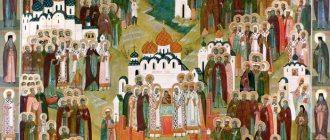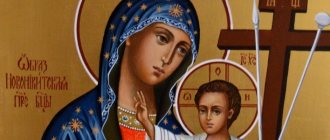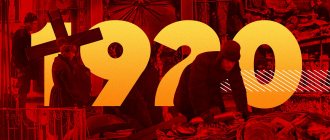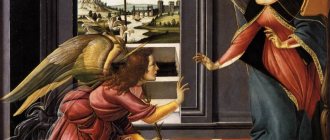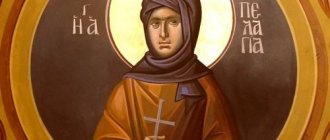| Cathedral of all unmercenaries. Icon |
The Council of All Unmercenary Saints
(Greek: Σύναξις πάντων των Αγίων Αναργύρων) - celebration in honor of all saints, during their lifetime and after death, glorified by the gift of healing Memory: October 17 [1] (Greek [2], Cyprus [3] ]), in The week closest to November 1 [4] (Athos. [5])
The list of the Council of the Cypriot and Greek Orthodox Churches [3] includes 20 saints:
- mchch. Cosmas and Damian of Rome (+ 284; commemorated July 1)
- mchch. Cosmas and Damian of Asia (no later than the 4th century; commemorated November 1)
- mchch. Cyrus and John (+ 311; commemorated January 31, June 28)
- Vmch. Panteleimon (+ 305; commemorated July 27)
- sschmch. Hermolai of Nicomedia (+ c. 305; commemorated July 26)
- St. Sampson the Host (+ 530; commemorated June 27)
- martyr Diomede of Tarsus (+ IV century; commemorated August 16)
- sschmch. Mokiy Amphipolis (+ ca. 295; commemorated May 11)
- martyr Aniketas of Nicomedia (+ 305; commemorated August 12)
- martyr Falaley Aegean (+ 284; commemorated May 20)
- martyr Tryphon of Apamea (+ 250; commemorated February 1)
- martyr Julian of Emesa (+ 312; commemorated February 6)
- mchch. Cosmas and Damian of Arabia and their brothers Leontius, Anthimus and Eutropius (+ 287/303; commemorated October 17)
In the service of the Council of All Unmercenaries [6], in addition to those listed above, eight more saints are mentioned:
- ap. and the Evangelist Luke (+ c. 84; commemorated April 22, October 18)
- sschmch. Antipas, Bishop of Pergamon (+ c. 68/92; commemorated April 11)
- martyr Photius of Nicomedia (+ c. 305; commemorated August 12)
- Vmch. Artemy of Antioch (+ 362; commemorated October 20)
- sschmch. Blasius, Bishop of Sebastia (+ c. 316; commemorated February 11)
- St. Spyridon, Bishop of Trimifunt (+ c. 348; commemorated December 12)
- sschmch. Charalampius, Bishop of Magnisia (+ c. 202; commemorated February 10)
- St. Modest, Patriarch of Jerusalem (+ 634; commemorated December 18)
Icons “Holy Doctors and Healers”
This icon is also called a medical icon. The canvas was written in the second half of the 19th century. It belongs to the category of paintings from a private collection. Such images were often used by Old Believers. A special feature of the canvas is the captions under the main image about how and to whom to pray.
The Holy Trinity is traditionally placed on the first line. This is the key image for the meeting. Then, most often, Patriarch Nicephorus, Holy Queen Alexandra, Saint Alexis.
Nikephoros was the Patriarch of Constantinople. He lived during the 9th century. The iconoclast and ruler Leo the Armenian sent him into exile, where he spent 13 years and then died. Under Queen Fedora, the relics of Nicephorus were found, which remained incorrupt. After the relics were transferred, healing miracles began to occur.
Holy Queen Alexandra is a holy martyr who witnessed the torment of St. George the Victorious. She saw with her own eyes how the Lord protected his archangel, so she believed everything and accepted Christianity. For which she suffered and was executed by the pagans.
Saint Alexy - this is how the man of God is depicted, who is considered the patron saint of fishermen. He primarily carried out the ascetic ideas of the Lord. Then, after his death, he was called into the kingdom of God.
This holy healing plant helps people heal. Those who touch it, pray regularly and lead a correct lifestyle receive everything they ask for.
Icon “Cathedral of 12 Holy Healers”
The canvas that bears this name can actually contain a different number of healers: from 12 to 36, but the name is the same.
The key figures in this painting are the holy brothers Cosmas and Damian. They lived around the 3rd century in Rome.
One day the brothers healed the Roman emperor. After that, they began to constantly help people, but made a vow that they would never charge for it. Cosmas broke his vow once. The sick woman whom he healed asked to take 3 eggs as a gift as a sign of respect for the Holy Trinity. Damian found out about this and became angry, he cursed his brother and ordered them to be buried separately. After the death of the brothers, the Lord revealed to people the truth that Cosmas accepted the gift in the name of love for God. Then the brothers were buried together.
Traditionally, Photius and Anicetus are depicted as part of the Council. They were relatives. From childhood they were raised as Christians. Both were involved in charity work. Deocletian, the ruler of Nicodemus, organized the persecution of Christians. Anikita spoke publicly against the ruler. Then they grabbed the saint and began to torture him. But the saint remained unharmed. Then his nephew Photius supported him. The martyrs were burned at the stake, but their bodies were not damaged on the fire. The martyrdom of Photius and Anicetas became a symbol of Christianity.
Falalei is another figure that is invariably present on the icon. Both parents of the unmercenary were Christians, and his brother served as a subdeacon. Falalei studied the art of healing from early childhood. After reaching the age of 16, he began treating people for free. When he turned 18, he was arrested and accused of preaching a new religion. Falalei did not deny the accusations. He suffered martyrdom with the name of Christ on his lips.
Saint Tryphon was born into a Christian family, and from early childhood he had the services of healing. As a result of the healing, Tryphon asked only one thing - to believe that Jesus Christ was helping him. The persecutor of Christians, Akilin, heard about Tyrfon, ordered him to be arrested and forced to renounce his preaching. But Tryphon firmly stood his ground. Before he died, he said that he would be happy to sacrifice his life for Christ.
Canon to the Council of All Unmercenary Saints.
November 14.
General beginning and end of the canons Troparion, kontakion, glorification of saints Akathists to the saints of God
Troparion, voice 8:
Saints without money and wonderworkers,/ visit our infirmities:/ accept thou, give us thou.
Canon, tone 4. (for 8 troparia in every song).
Song 1
Irmos: I will open my lips, and they will be filled with the Spirit, and I will vomit a word to the Queen Mother, and I will appear, brightly triumphant, and I will sing, rejoicing, These are miracles.
Chorus: Holy saints without silver and healers, pray to God for us!
By faith I ask you to be given the word of wisdom, O servants of the Lord’s light, so that I may sing and rejoice at your honest triumph.
The memory of the unmercenaries is honored today, with a pure heart and immaculate conscience let us sing of them, so that through their intercession we may receive the grace of healing.
The earth will give rise to you, the Divine Free One, and the sky will have your spirits of glory, for having lived heavenly life on earth, now rejoice there.
The soul has learned to heal more than the body by cunning, and you appeared to both to be all-kind, Luko, inspired by God’s wisdom, who heals those who call upon you.
Heal the passions of the souls and the bodies of your singers, O all-blessed Luke, cutting away the rottenness with the mysterious handiwork of sin, O God-wise Apostle.
The Church is the medicine for the sick, and in it, Hieromartyr Antipo, your patient body lies, releasing the Spirit from the Divine dawn of gifts.
Glory: The sacred relics of your sacred relics wear away the myrrh of healing, driving away evil passions and yours, Antipo, glorifying the memory of the fragrant.
And now: We bring You, the flesh that gave birth to You, the Ever-Virgin, to the prayer of Your power, Christ, and the Council of the Unmercenary. Let our lives die with those prayers.
Song 3
Irmos: Thy hymn-speakers, Mother of God, living and unenvious source, spiritually establish the face of the whole body, in Thy Divine glory the crowns of glory of the Lord.
Like the lights on the Divine firmament of the Church, you illuminate the faithful with the light of miracles, which you never cease to perform, bringing glory and healing ailments.
Having completed the same course, you will receive equal gifts and equal honors in Heaven, the miraculous Mother of the Free One.
With love for God and your neighbors, you destroy all the malice of demons with grace: for this reason, venerable ones, we perform a celebration.
The Divine Fire is within you, extinguish our passionate flame, blessed ones, the meaning of faith is warming.
We now glorify the all-honorable triple companion of the Venerable Cosmas and Damian, the deeds of the same ones, as well as by naming.
With bright life, firm faith and zeal, she rose from Rome, from Asia and Arabia. Moreover, together we will be respected.
Glory: Come, be healed of your ailments, you who are sick: the three-numbered two are enriched by the grace of the Trinity, and give healing to those who sing by faith.
And now: O Mother of God, who gave birth to the healer of souls and bodies, grant us healing, pouring out the oil of Thy mercy for our health and salvation.
Sedalny Bezmezdnikom, tone 8:
Like cries, like thorns, You adorn yourself with the Spirit, and release incense to everyone. For this reason we resort to you, God-bearing Bezsrebrenitsa, pray to Christ God for the remission of sins to grant your holy memory to those who celebrate love.
Glory: We have received blessed hopes, from all you are worthily blessed, as the fulfiller of our God’s Divine desires, having appeared as a physician of incurable ailments, the great-named Bezdnitsa. Heal our passions and kindle the despondency of the clouds that call you with faith.
And now: Come, we magnify the All-Tsarina with our voices, and sing and cry out: Like the joy of wine, O all-singing Virgin, save those who honor You, and protect them from all kinds of temptations, and illnesses, and sorrows. Imashi for the Mother of God has the boldness to have mercy on us. For this reason we pray to You: pray to Your Son and God to grant forgiveness to Your servant.
Song 4
Irmos: The unsearchable Council of God, even from the Virgin of the incarnation of You, the Most High, the prophet Habakkuk saw calling: glory to Your power, Lord.
Behold, the glorious and all-clear memory of the God-blessed doctors has risen, and gladdens the hearts of people named after Christ, flowing to their healing relics.
Panteleimon, the most praised great martyr, with Ermolai, his glorious announcer, is worth remembering today, as in the beginning of Bezsrebrenitsy.
Let us sing with all our lips and hearts, Passion-bearers of Christ, Ermolai and Panteleimon, rejoice, - calling, - representative and intercessor of the monastery of the sowers and our healer.
Ermolai, with the sacred prayers and Panteleimon, the namesake of mercy, do not deny Thy mercy from us, O All-Merciful Lord, but usually by being generous, deliver us from the evil ones.
The bright one appeared through life and struggle, the brightest one, Panteleimon, with the title of a rich man from above, even as you proclaim the deeds of all those who call you for help.
To those who come running to your protection, O Healer, take away every disease, and now visit with faith those who pray to you and deliver the various ailments.
Glory: The kindness of the honest Unmercenary, the beauty of the holy martyr, be the physician of the ailing, Panteleimon, intercessor for us to the Most Holy Trinity.
And now: As the cup overflows, O Master, Thy grace and the great wealth of love for mankind, Thy All-Good Matter and the most honorable without silver.
Song 5
Irmos: Everyone was terrified of Your Divine glory: You, the Unartful Virgin, had in your womb God above all and gave birth to the Flightless Son, giving peace to all who sang Your praises.
Cyrus and John let us sing of Divine love and martyrdom for Christ, for through the glorious struggle, courageously against weariness, the praise of the martyrs appears.
There are two shining luminaries - Cyrus and John, miracles of radiance from the source of one luminous source, exuding imperishable grace to the weak, and let us bless them.
O squires of Christ, to the sick physicians, Cyrus and John are rich, you received miracles from the Almighty God, heal those who sing.
I praise Mokiya with songs, and Photius and Anikita, who exist in the person of the God-bearing Free Ones, who are quick helpers for those who call them in troubles and sorrows.
Those who have the light of beads and are honest in their commitment, the honest Church is adorned, all-blessed Mokie, gratuitous doctor.
The sufferers of Christ, Photios and Anikitos, appeared like a majestic lamp, illuminating with rays of healing and Divine feats all creation.
Glory: You heal the passions of the faithful, depicting the blessed passion with your passions, and take away illnesses, and drive away fierce spirits, Photios and Anikitos of glory.
And now: Weakness and relaxation, O omnipotent Lady, transform our souls and bodies into strength and health, so that we can cheerfully carry out the commandments of Your Son and God.
Song 6
Irmos: This divine and all-honorable celebration, O God of Wisdom, Mother of God, come with our hands clasped, from Her we glorify the God who was born.
O all-honorable celebrant of your celebration, Christ-imitator of praise and warmest intercessors, we ask you for your faithful help.
Obeying the Divine command, the Divine Wisdom, you do not desire to take anything in retribution, you accept nothing, you give nothing, even to life and salvation.
Today we honor the venerable Sampson with Diomedes, honoring the face of the Unmercenary, the prayer books offering these to God and the King of all.
With your glorious, father, healing, even with illnesses you have acquired, we will not fail to visit you, we pray, in compassion alleviating the illnesses and labors of our souls.
With divine clothing, martyr Diomedes, with power, you cure illnesses, resolve ailments and drive away evil spirits, as in those who are without mercy beyond measure.
Decorate you with the grace of the Spirit of giving: with your prayers, Artemy is glorious, every ailment ceases in the people who come running to you.
Glory: O great martyr, the corruptible passions of you, calling on you with faith to temptations and sorrows, imitator of Spasov, Artemy, saint of the Trinity.
And now: Deliver us, Most Pure Lady, from all wrath, famine and destruction, and eternal torment, Virgin, free Artemy through intercession.
Kontakion, tone 2:
Grace accepts healings, you extend health to those in need, physicians, wonderworkers of glory; but by your visit to the warriors, you will overthrow insolence, healing the world with miracles.
Ikos:
The word of the wise doctors passes away all reason and wisdom, and knowledge is given to everyone: Having received the highest grace, they invisibly grant health to everyone. Hence, I too can tell you that the grace was given to the singers, as God-bearing saints of Christ and servants who give many healings: for they take away all illnesses, and heal the world with miracles.
Song 7
Irmos: Having not served the creation of the Divine Wisdom more than the Creator, but having bravely overcome the fiery rebuke, I rejoice and sing: blessed father is the Lord and God.
As we praise you, O all-praised ones, surpassing both our mind and our word, and greatly surprising miracles, about them we call: Fathers, the Lord God is blessed.
Do not at all love the vanity of Godly wisdom, below the sweets of life, but hold everything in your mind, having Christ, to Him you cry: Blessed are you, Lord God.
Why don’t we sing the seal and praise of the glorious face of the Venerable Ones, the honest duo – Phalaleus and Tryphon, the valiant-wise, who continually perform many miracles.
Healing appears to the faithful through your blood drops, Falale, washing away ailments and quenching fierce fires, by the grace of Christ the Crowned One.
Grazing geese in the bushes, you received the grace of healing from God, Great Martyr Tryphon - a free doctor to heal human infirmities and ailments.
Your scabs, martyr Tryphon, smell like ointment, your blood exudes healing, and the remains of your body sanctify the souls of those who touch it.
Glory: Deliver your servants, O Trihypostatic God, from bodily illnesses and mental infirmities, and keep them unharmed from all worldly temptations.
And now: You exude from the Unmercenary the honest streams of healing to the sick, O Virgin, everywhere: You are the source of mercy, showing the mercy of the Lord, from You incarnate.
Song 8
Irmos: The pious youths in the cave of the Nativity of the Theotokos saved, then what was formed, now active, raises up the whole universe to sing to You: Sing to the Lord the works, and exalt Him to all ages.
Holy art thou, O Almighty, glorifying Thy saint: for the world for the sake of those who deliver from troubles and enlighten those who sing and extol Thee forever.
In the village of Vyshnyaya, instilling, in everlasting remembrance, you do not cease to show mercy towards those who are on earth and do good to those who sing and extol the Lord forever.
To those who are verbal and to those who are dumb, the benefactor is to show God, Blessed Blasie, your corrections; Moreover, you have received the gift of healing.
Reverend Saint Blasie, who bore the wounds of Christ’s passion, who gave Thee the grace to heal all illnesses; Moreover, give us good gifts and help us.
Your mind, Spyridon, having been enlightened by dispassion and adorned with humility, has been enriched by the gift of the Spirit, driving away spirits and solving ailments of those who faithfully honor you.
The river of the gifts that are in you will water your heart in every way, like St. Spyridon; grants health to everyone, all God raises up the glorified you to glory.
Glory: You are merciful, Indivisible Trinity, for you are merciful to all, as you are all-generous, so we resort to You, even if we are aggravated by sins, crying out: cleanse Your servants.
And now: For those who have placed their hopes in You, Lady, from the Unmercenary, we pray that we will be delivered from future condemnation and be granted entry into the Kingdom of Heaven.
Song 9
Irmos: Let every earth-born leap, let us be enlightened by the Spirit, let the nature of disembodied minds triumph, honoring the sacred triumph of the Mother of God, and let it cry out: Rejoice, All-Blessed, Pure Mother of God Ever-Devo.
In remembrance of our common intercessors, let us diligently cry out to them: remove ye who sing from all harm, and sorrow, and cruel ailments.
In the sanctuary of the miracle worker and in the passion-bearer's workshop of the unmercenary assistant, the sick doctor and the pestilence banisher, let us please Charalampius.
The great defender of the faithful and deliverer from troubles appeared to you, the God-Wise Haralampia, who glorified you for all freedom of anger and all-destructiveness.
The illness of body and soul ceases, to yours, Haralampie, with the relics revered and kissed: Christ has given this gift of healing and fierce reflection.
Let us today praise Modestus, the lamp of the Church, placed on the candlestick of Zion, whose rays of mercy are shining, healing diseases of men and animals.
You were the shepherd of Jerusalem below, compassionate with the verbal and the dumb, and you were the inhabitant of the City of Mount Mountains, where you remember those who remember you.
Glory: Accept, Christ-imitating Bezsrebrenitsa, this little song of ours, and ask for forgiveness from the Trinity for the many sins we are guilty of.
And now: Good Savior, having sung the prayers of Thy Mother and all the highly praised Unmercenaries, Thy mercy and help from Heaven have been sent down to us who call upon Thee.
Luminous:
Like bright stars, you adorn the rational firmament, holy Bezmernitsa, and enlighten the faithful dawns with signs. Moreover, we pray to you, God-bearers: kindle the darkness of our passions with your intercession to the Lord.
Prayer to the holy unmercenaries
O glorious wonderworkers, doctors of mercilessness, earthly angels and heavenly people, quick-to-obedience helpers to all who come running to you! You, God's saints, fill the whole world with countless miracles and not only heal bodily ailments, but also enlighten souls with the faith of Christ, strengthen them in the endurance of illnesses, admonish those in serious illnesses about correcting their lives, direct to Christ through repentance and by the power of Almighty God abundant gifts of grace. you exude help. For this reason, we, unworthy and sinners, come to you, unworthy and sinful, with reverent love and pray: hear the sighs of many suffering people, beg the Heavenly Doctor of our souls and bodies and His Most Pure Mother to grant us healing from our ailments, save us from fierce and incurable diseases, from weakening of the body, from frenzy of mind and deadly ulcers, from sudden death, from all misfortune and sorrow and from all evil; help everyone who lies in weakness and despairs of human help, but who comes running to you with hope; Give consolation and joy to everyone in hard work, in captivity and prison, to the despondent and, through your warm intercession to God, keep those who are diligent in the Orthodox faith, in the thought of God, in prayers to God; pray to the Lord, may he give us all a Christian death that is painless, shameless, peaceful, that we may partake of the Divine Mysteries, and a good answer at His Last Judgment, that with the hope of salvation we may reach the Kingdom that the Lord has prepared for those who love Him, and that we may be worthy to glorify together with you, saints of God Father and Son and Holy Spirit forever and ever. Amen.
Saints who had the gift of healing
Not everyone who was canonized had the gift of healing. The Lord does not give it to everyone. The Orthodox Church especially honors saints who have this ability.
The most famous Christian healers:
- Panteleimon. A saint who is revered as a free healer. He is exalted because of Divine abilities and martyrdom. Panteleimon believed in Christ when he saw a child die from a snake bite, and the believer resurrected him with his prayers. Since then, Panteleimon converted to Christianity, for which he received the gift of healing. He deprived charlatan doctors of income, since he did everything for free, so he was arrested and executed by the pagans.
- Saint Zenaida of Tarsus. Saint who lived in the 1st century. Zinaida is revered as a martyr. Together with her sister, the saint was a relative of the Apostle Paul. This placed special obligations on her. After Peter’s sermons, the sisters left their usual home and went to live in caves. There they received people. Zinaida received the gift of healing. There the saint received people, gave them hope, but never took money. The pagans stoned the sisters.
- Damian Tselebnik. Monk of the Kiev Pechersk Lavra, who is commemorated on September 28. The monk was glorified for his ability to help people, relieving them of any illness. Each time the healing took a lot of strength from Damian, so he did not live long, and then was canonized as a holy healer. The saint is asked to give strength, strengthen faith, and help relatives improve their health.
- Prokhor Lebednik. A monk of the Pechersk Monastery who led an ascetic lifestyle. He got his nickname because he ate quinoa instead of bread. Throughout his life, Prokhor drank nothing but water. One day, where Prokhor lived, famine began. He began making quinoa bread. Thus, the monk saved many people. After death, the relics became miraculous. By touching them, those whom the saint knew during his lifetime were healed.
- Alexander Svirsky. The monk, who had the gift, healed mainly paralyzed patients. In addition, he is known for being approached for the gift of male children. He was destined for a long life, from which he passed away quietly and calmly. The monk lived in the 16th century and was canonized 100 years after his death.
- Andrew the First-Called. A holy apostle who was originally a fisherman, but then followed Jesus and became a preacher. The saint was crucified for his faith and suffered martyrdom. The relics began to heal people immediately after the death of St. Andrew the First-Called.
- Blasius of Sevastia. A representative of early Christianity, who was ranked among the healers by the Orthodox Church. He helped people during his lifetime, treated them for free, mentored them, and gave advice. After his death, the relics became miraculous. When people touched them, they received comfort and began to experience grace.
- Vasily Novgorodsky. Lived in the 14th century. He was an archpastor. He is known and revered for the fact that during the epidemic of ulcers that destroyed the inhabitants of Pskov, he was not afraid to come and give all believers hope for healing. Traditionally, people pray to Vasily for deliverance from ulcers.
- Great Martyr Saint Barbara. Lived in the 4th century. She is known for independently converting to Christianity. When the pagan father found out about this, he immediately handed over his daughter to the ruler who persecuted Christians. He began to torture the girl, but at night the Lord himself appeared in her cell and healed her wounds. After this, the girl was subjected to even greater torture. She was taken naked through the streets of the city and beaten with stones. After this, the saint's head was cut off. They pray to Varvara in order to overcome mental torment.
On every first Sunday after the day of remembrance of the holy unmercenaries and wonderworkers Cosmas and Damian of Asia (this year on November 18 ), the Church remembers the memory of all the holy healers, unmercenaries and wonderworkers. The holy image of twelve of them: Cosmas and Damian, Cyrus and John, Panteleimon and Ermolai, Sampson and Diomede, Photius and Anicetas, Thalaleos and Tryphon is in the iconostasis of our temple, and also in honor of the holy 12 Healers the second small Altar of our temple was consecrated . Most of the saints listed were doctors before they turned to God and, having believed in Christ, they continued to help the sick. But they no longer treated only and not so much with their medical art, but by invoking the Name of God, prayer, anointing with blessed oil, and sprinkling with holy water.
They did not charge fees for healings, for which they were called unmercenary. They only asked for one thing: that those healed would holyly believe in God, live in piety, keeping God’s commandments. If those being healed were not enlightened by the light of the Gospel, then they tried to convert them to the Christian faith. Thus, through their special service and active charity, they brought the preaching of Christ, the Gospel of the Kingdom of God, to the world. “ The grace of the unmercenary saints is endless,” sings the Holy Church on the day of their memory. The names of the wonderworkers Cosmas and Damian, Cyrus and John, Panteleimon and Ermolai, Sampson and Diomede are prayerfully invoked in the sacrament of Unction (Unction). We ask for forgiveness of sins and, as a result, healing from illnesses. And the holy miracle workers offer our prayers to God. In itself, health in Christianity is not the highest value. Through the prayers of the saints, the Lord abundantly grants miracles of healing, not so that we have more opportunities to acquire the treasures of this world - money, official position, fame. The Lord strengthens our bodies so that we become stronger in faith and gain strength to leave a sinful life. So that we, having received grace for free, follow the example of holy healers, share it freely, joyfully distribute it to everyone around us. Both regular parishioners and many people from the City Clinical Hospital, which is located nearby, pray in front of the icon of the holy healers in our church . The sick and their loved ones come to pray for a speedy recovery. Many then return to the temple with gratitude to God. They thank the holy miracle workers and testify that through the prayers of the healers, the Lord granted them what they asked for. “It is easier to measure the sea and count the stars than to list all the miracles of the saints,” says the biographer of Saints Cosmas and Damian of Assia. These words can be safely spoken about each miracle worker separately, and even more so about the entire council of healers. The miracles of healing that occurred through the prayers of the saints attracted not only the sick. Many people, seeing manifestations of the power of God, listened to the preaching of the gospel of the Kingdom of God and became true Christians. All twelve unmercenaries and healers ended their earthly feat with martyrdom for the confession of Christ, but they did not end their charity to Orthodox people, and still help everyone who comes to them with faith and prayer for help. In 2005, His Holiness Patriarch Alexy II of Moscow and All Russia consecrated the Antimension to the side Altar for our church in the name of the holy 12 Healers, on which the early Divine Liturgy is celebrated. And every Sunday evening in our church we serve Vespers and Matins with Akathist to the holy 12 Healers, Unmercenaries and Wonderworkers .
“Rejoice, holy unmercenaries and miracle workers, healers of our sins and illnesses!”
